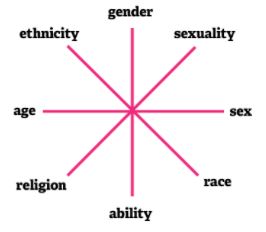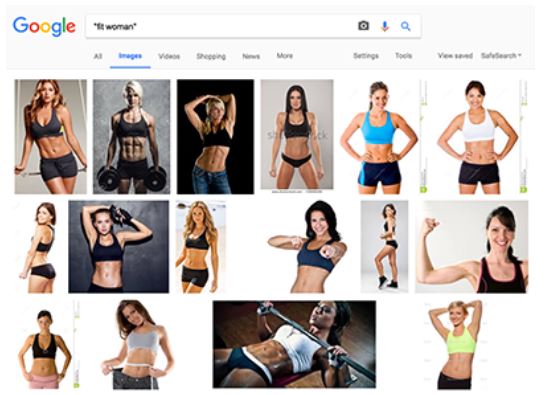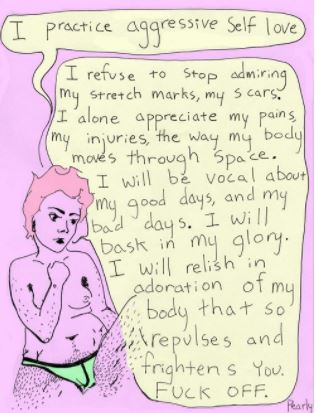 A reflection by student staff member, Sydney, about her experiences with body image, working out, and how these things connect with her feminism and self love.
A reflection by student staff member, Sydney, about her experiences with body image, working out, and how these things connect with her feminism and self love.
Trigger Warning: This blog deals with body image, body dysmorphia, and unhealthy eating practices. Please use self-care.
We live in a day where thick (curvy, slim-thick) is in but what this really means is women with thick thighs/large butts/ big boobs and a TINY waist. One thing thick still doesn’t seem to mean is fat. The media, men, and other women are still always critical of unwanted fat/cellulite/stretch marks and ways to get rid of them… especially in a time where “Fitspo” has become popular. Let me start off by saying I’m a feminist who believes in radical self love… I’m also a feminist who has a love-hate relationship with working out. I grew up being a year round competitive athlete, basketball, cross country, track, soccer (you name it!), so any time outside of school was spent in gyms or outside practicing skills. I never thought about my body much as an athlete- let me rephrase that… I never thought about the good my body was doing when I was an athlete. I knew I was strong but I thought it was because I was large. “I’m bigger than my friends therefore I have to be stronger than my friends”. Was I actually bigger than my friends though? The photos say no. It never occurred to me that my perception of my body was completely warped. I saw myself as overweight, much bigger than my friends, and was constantly aware of what I was wearing and how people perceived me. And as a young girl who was in Catholic School (Catholic guilt is the real deal), didn’t know much about feminism , and had a mother with body image issues, I was stuck in the perfect storm. My body was always at the front of my mind. I binge ate, starved at some points (why did I throw away so many lunches when I LOVE food?), and was just overall unaware of how toxic my mentality was.
 When I graduated high school, I stopped playing sports and focused on school. I turned to feminism and activism to help me understand myself and the world, and I still worked out pretty regularly… I also gained 40 pounds. But guess what else happened? I learned to love my body. Now don’t get me wrong, I still look at my stretchmarks or fat rolls and sometimes feel like a “lazy loser” but I also know that my body does amazing things just to keep me alive, that I am strong, and that all bodies are good bodies. Here’s an important disclaimer though- I’m overweight, my doctors bring it up, my friends notice it, my parents comment on it, and guys tend to tell me “I love bigger women” but overall I’m still seen as “normal” by society. I can still find clothes in most stores, my fat is distributed pretty equally over my body, and I can still move throughout space with ease. I realize that due to this I experience both thin privilege and fat shame at different times. I have come to understand that my experience is a privilege because I CAN find a break from the constant judging in certain spaces.
When I graduated high school, I stopped playing sports and focused on school. I turned to feminism and activism to help me understand myself and the world, and I still worked out pretty regularly… I also gained 40 pounds. But guess what else happened? I learned to love my body. Now don’t get me wrong, I still look at my stretchmarks or fat rolls and sometimes feel like a “lazy loser” but I also know that my body does amazing things just to keep me alive, that I am strong, and that all bodies are good bodies. Here’s an important disclaimer though- I’m overweight, my doctors bring it up, my friends notice it, my parents comment on it, and guys tend to tell me “I love bigger women” but overall I’m still seen as “normal” by society. I can still find clothes in most stores, my fat is distributed pretty equally over my body, and I can still move throughout space with ease. I realize that due to this I experience both thin privilege and fat shame at different times. I have come to understand that my experience is a privilege because I CAN find a break from the constant judging in certain spaces.
Like I said, I still like to workout. I like the discipline of it that I learned through sports, and I think I always will. There are major benefits to working out. I like to go into the gym and lift weights or kickbox or do something that makes my muscles scream afterwards. For me, this is a form of radical self love, but it isn’t for everyone, and moreso this love can turn to hate really easily. I workout to feel strong, not skinny, but those two are easy to conflate and I often find myself walking the fine line, and falling on the toxic side if I’m not careful. What is supposed to be about strength and love can turn into weight and fat in the blink of an eye, and it is a constant game of checks and balances (going to the gym…but not twice a day… appreciating my body…but not weighing myself) to make sure I don’t go there. So just as much as I workout to get in a good mental space, I also often have to stop working out to remain in that good space. Even when doing this, I constantly struggle with the guilt over not working out or the guilt of working out for the wrong reasons. Let me just say this- deciding to love your body does not mean your body issues disappear.
 I found Bikram Yoga to be a very healthy way to workout and feel strong- I was feeling confident and in touch with my body while not worrying about weight. The problem- Bikram Yoga as well as fitness classes are EXPENSIVE (I’m talking over $100 a month here), which leads me to my next point. Fitness is a feminist issue AND an intersectional one. Some women don’t want to workout to feel self love. Some do and can’t afford it, and some aren’t represented in the fitness world at all. Sidenote, if you hate running, don’t do it! Hate the gym? Don’t go! What works for some and what some see as self love isn’t for all and it would be pretty antifeminist to try and insist it does.
I found Bikram Yoga to be a very healthy way to workout and feel strong- I was feeling confident and in touch with my body while not worrying about weight. The problem- Bikram Yoga as well as fitness classes are EXPENSIVE (I’m talking over $100 a month here), which leads me to my next point. Fitness is a feminist issue AND an intersectional one. Some women don’t want to workout to feel self love. Some do and can’t afford it, and some aren’t represented in the fitness world at all. Sidenote, if you hate running, don’t do it! Hate the gym? Don’t go! What works for some and what some see as self love isn’t for all and it would be pretty antifeminist to try and insist it does.
We know poor women are more likely to be overweight and that curvy figures are more accepted by women of color, but what does this mean for women who want to workout or engage in health related activities but don’t have the funds or don’t see themselves represented? If you search “fit woman” on the internet what do you get? White women. White women with muscles. White women with no body fat. Now that, in itself, is an issue, but add in that these women are all able bodied (Inspiration Porn is real too yall, don’t even get me started), they are feminine, and they have all the trendy gear and equipment they need.

Let’s be real here, I haven’t worked out in months. I’m a grad student taking a full course load and working two jobs- when that’s done, I just want to go to bed. I still miss it… specifically lifting… but right now self care means something different. I also still feel guilty about it- especially when my clothes don’t fit or I’m “feeling fat”, but I’ve also been better about putting things in perspective and keeping a healthy mindset. I don’t have all the answers here. Fitness and feminism is a hard issue and not everyone has a healthy relationship with working out, (like I said, sometimes I don’t either) but I needed a space to discuss the fact that this is a conflicting issue with me, that I struggle, and that I’m trying my best. I think other women could use this space as well. So here’s to figuring it out together,
“All bodies are good bodies. You do not need to lose weight to have a good body. All bodies are real bodies. You are perfect at whatever size you like best. I preach this loud and proud to my friends, to my niece, to my mother, to my girlfriend. Honestly, I truly believe it. I also believe in giving a big middle finger to society’s standards of beauty, and I think it’s completely true that anyone can be healthy at whatever size they are.” – Sarah Hansen

Note: I purposefully left my weight out of this blog. I went back and forth on this decision but ultimately decided it would not do any good or help my point by just adding numbers in.
Links for further reading:
The complicated relationship between feminism and fitness
How to work exercise out of self love not fat shaming
About how you don’t always have to love your body
Some other blog posts about bodies:
How my feminism intersects body consciousness with health benefits

